赖世雄美语入门 Lesson 13 At the Department Store
- 格式:pptx
- 大小:366.09 KB
- 文档页数:13
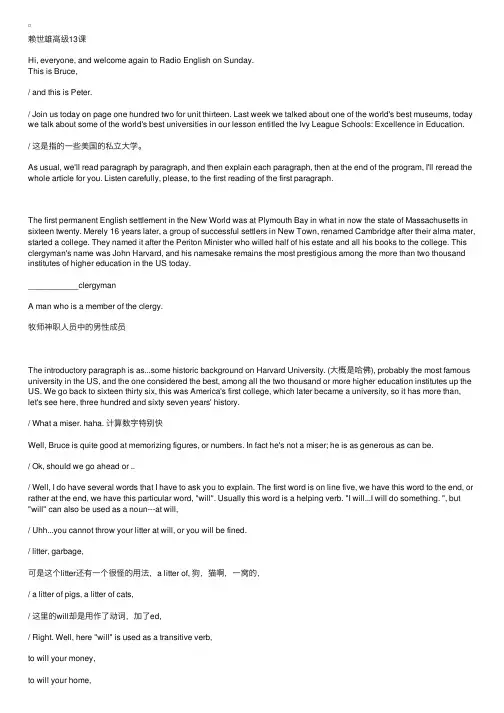
赖世雄⾼级13课Hi, everyone, and welcome again to Radio English on Sunday.This is Bruce,/ and this is Peter./ Join us today on page one hundred two for unit thirteen. Last week we talked about one of the world's best museums, today we talk about some of the world's best universities in our lesson entitled the Ivy League Schools: Excellence in Education. / 这是指的⼀些美国的私⽴⼤学。
As usual, we'll read paragraph by paragraph, and then explain each paragraph, then at the end of the program, I'll reread the whole article for you. Listen carefully, please, to the first reading of the first paragraph.The first permanent English settlement in the New World was at Plymouth Bay in what in now the state of Massachusetts in sixteen twenty. Merely 16 years later, a group of successful settlers in New Town, renamed Cambridge after their alma mater, started a college. They named it after the Periton Minister who willed half of his estate and all his books to the college. This clergyman's name was John Harvard, and his namesake remains the most prestigious among the more than two thousand institutes of higher education in the US today.___________clergymanA man who is a member of the clergy.牧师神职⼈员中的男性成员The introductory paragraph is as...some historic background on Harvard University. (⼤概是哈佛), probably the most famous university in the US, and the one considered the best, among all the two thousand or more higher education institutes up the US. We go back to sixteen thirty six, this was America's first college, which later became a university, so it has more than,let's see here, three hundred and sixty seven years' history./ What a miser. haha. 计算数字特别快Well, Bruce is quite good at memorizing figures, or numbers. In fact he's not a miser; he is as generous as can be./ Ok, should we go ahead or ../ Well, I do have several words that I have to ask you to explain. The first word is on line five, we have this word to the end, or rather at the end, we have this particular word, "will". Usually this word is a helping verb. "I will...I will do something. ", but "will" can also be used as a noun---at will,/ Uhh...you cannot throw your litter at will, or you will be fined./ litter, garbage,可是这个litter还有⼀个很怪的⽤法,a litter of, 狗,猫啊,⼀窝的,/ a litter of pigs, a litter of cats,/ 这⾥的will却是⽤作了动词,加了ed,/ Right. Well, here "will" is used as a transitive verb,to will your money,to will your home,to will your property to...others, usually your hunband or your wife or your children. If you have things that you want to give people after you die, you will things to them./ will, 通常还有⼀个名词的意思,(除了at will外),指遗嘱,last will, one's last will.As a verb, "to will something to someone."Ok, let's go ahead to the next paragraph, which tells us more about Harvard and the other Ivy League Schools.Harvard is not the only great school in the US, of course. A small industry has grown up around the ranking of the best tertiary schools, and year after year, seven schools dominate most of these top twenty or top fifty lists. Harvard is nearly always at, or close to, the top, joined frequently by Yele, (in Connetikit, 地名) Presiden ( in New Jersey 地名) , Darknet (in New Hansher,地名), Cornale (in New York state), Columbia (in New York city), the university of (Pensilvaia 地名) and Brond (in Rold Island.地名). These eight private universities are collectively referred to as the Ivy League Schools.Well, we started all (of?) talking about Harvard as being, probably the best known, if not, also the best university in the US, but there are seven other schools, whose names we are often familiar with, because we hear about them so often. Certainly Yele and Pensiton are world-famous, probably also Cornao, Columbia, and maybe the university of Pensivania. Two other smaller schools but very high quality, and Darnet and Bron.These eight private universities, there are not state universities, there private universities together are often called the Ivy League schools./ Well, these are schools that are no doubt, you know, top-notch schools, around the United States. Top-notch schools means very very good schools in the US, but there is one school that I would like to specifically mention, Prinston, because for those who are interested in studying in the US, this is a school that you have to very mind, because this school is responsible for all kinds of English tests, including Tofel, GRE, GMD, things like that./ Very very good school. We'll find out more about Prinston later. Let me spell the "top notch" for you. "top-notch". 拔尖的,第⼀流的,的,Sometimes we just say "a top school.", but you hear some people say "a top-notch school". Also the same idea, the best or one of the best./ ..be referred to as...---> be calledHe is referred to as a hero...no, the sentence is wrong. It should be "Peter is referred to as, Peter Lai is referred to as a hero." :DOK, let's go ahead.Why the name? Ivy is a vine, that is, a plant which grows up, or along the surface of other plants such as trees or, in the human landscape, along the sides of stone buildings. As these eight universities are old, the youngest among them Cornell was founded in eighteen fifty three, Ivy has had plenty of time to decorate the outsides of the more historic buildings on these campuses. The the "League", however, is more an invention of imagination than the reality. Though there is an association called the Ivy League, it refers to the above schools' participation in an American football athletic conference rather than to any academic alliance. Further, despite the lengthy academic lineage of these schools, the footballing Ivy League was not formally formed until nineteen fifty six. Though high competitive football, and other athletic games, has been hotly contested among the schools for many generations.This paragraph tries to explain why we call these eight universities "the Ivy League Schools". "Ivy" is a type of plant, and we can see it growing up in the long side stone buildings, old stone buildings on campuses, and from sixteen thirty six, to eighteen fifty three, this a little over two hundred years of history, these old old buildings are now covered with ivy. Now there is an ivy league but refers to these eight universities, which cooperate in a special football athletic conference. They had their own special competition. But that only started in nineteen fifty six. Actually, many of these schools, especially, Harvard and Yele, have had many kinds of competitions which are quite famous and much older than nineteen fifty six. So, ivy league is not the kind of...uhh, association you would think of, being an academic, many professors coming together to discuss things together. No, Ivy League actually refers to a football conference rather than an academic association./..Hey, how about the university ...(⾮常模糊, 可能是⼀个什么鸟学校的名字)/ Very good school./ Yeah,/ It ..many ..are in the next groups of very good universities./ competitive, compete, competent,During the highly competitive (ancros) examination, he qualified as a student enter Harvard.competent...I can find that word in my dictionary./ That's on every page of your dictionary."Competent" means that you can do the work that you are supposed to do, or you have the skills or knowledge to do something, uhh, which you need to do or your company or your school need you to do. competent./ But we have a very good and difficult word, "high-caliber,"/ "high-calibre" means among the best of something or great. British English is probably "calibre". American English often use "caliber".A high-caliber (technition), somebody who can operate machinery and does it very very well./ 相当于有能⼒的技术⼈员,叫high-caliber. _________⾦⼭词霸查不到这个字。

赖世雄初级美语入门赖世雄初级美语入门篇》听课笔记,持续更新中~(原创)这是《赖世雄初级美语入门篇》听课笔记,需要的请下载~~~wql 2004-12-04 16:41我急需cmczbms2004-12-06 12:09Lesson 01greetingsADont forget to say greetings to uncle Wang.见到王伯伯的时候不要忘了向他问好。
I hope you have a good morning.Who are you 你是谁Where are you 你在哪儿,How are you 你好吗,回答用,Im fine.Im a boy. You area boy. He is a boy.This bed is bad. 这个床很坏。
注意 bed 和 bad 的发音区别。
I seeyou there. 我看见你在那里。
See you. Good bye. Bye. See you later.Bhi 和 hey的区别。
Hows it goingGreat. Wonderful. Cool.How are you doing Howre you doing How are you回答用 notbad。
take care保重。
take care of yourself.You tooHave a good time. 过你愉快。
Thanks. You too.谢谢,你也一样。
cmczbms 2004-12-06 12:12Lesson1Greetings打招呼DialogAA: Good morning May. How are youB: Hi Tom.I’m fine. And youA: Not bad. Thanks.B: Good. Se e you.A: Bye.BA: Hi May. How’s it goingB: Great. And how are you doingA: Not bad.B: Ok. See you later.A: Take care.B: You too.A甲:早啊,小梅。

赖世雄美语笔记——魏仕超抄的学渣出版社STUDY-GARBAGE PRESS目录美语入门------------------------------------------------------------------------------------------------------------------------------------------ - 1 - LESSON 1 greetings -------------------------------------------------------------------------------------------------------------------------- - 1 - LESSON 2 courtesy --------------------------------------------------------------------------------------------------------------------------- - 1 - LESSON 3 what's your name ---------------------------------------------------------------------------------------------------------------- - 1 - LESSON 4 family name ---------------------------------------------------------------------------------------------------------------------- - 1 - LESSON 5 how do you do 相当于你好,不可以回答I'm fine ------------------------------------------------------------------------ - 2 - LESSON 6 it's five past three ---------------------------------------------------------------------------------------------------------------- - 2 - LESSON 7 月份------------------------------------------------------------------------------------------------------------------------------- - 2 - LESSON 8 there be 句型--------------------------------------------------------------------------------------------------------------------- - 3 - LESSON 9 he's not in ------------------------------------------------------------------------------------------------------------------------- - 3 - LESSON 10 can I be of any help for you --------------------------------------------------------------------------------------------------- - 3 - LESSON 11 准备好点单了吗-------------------------------------------------------------------------------------------------------------- - 3 - LESSON 13 牛排几分熟-------------------------------------------------------------------------------------------------------------------- - 4 - LESSON 14 没重点-------------------------------------------------------------------------------------------------------------------------- - 4 - LESSON 15 量尺寸-------------------------------------------------------------------------------------------------------------------------- - 4 - LESSON 16 one 做代词---------------------------------------------------------------------------------------------------------------------- - 5 - LESSON 17 查字典-------------------------------------------------------------------------------------------------------------------------- - 5 - LESSON 18 here we are ---------------------------------------------------------------------------------------------------------------------- - 5 - LESSON 19 how come------------------------------------------------------------------------------------------------------------------------ - 5 - LESSON 20 have a reservation 强调预定这件事的事实------------------------------------------------------------------------------- - 6 - LESSON 21 兑换外币银行说的话-------------------------------------------------------------------------------------------------------- - 6 - LESSON 22 问生日和介词用法----------------------------------------------------------------------------------------------------------- - 7 - LESSON 23 集合名词和arrive in --------------------------------------------------------------------------------------------------------- - 7 - LESSON 24 没重点-------------------------------------------------------------------------------------------------------------------------- - 8 - LESSON 25 though 有两种用法------------------------------------------------------------------------------------------------------------ - 8 - LESSON 26 程度副词强弱程度排列----------------------------------------------------------------------------------------------------- - 9 - LESSON 27 祈使句的反义疑问句-------------------------------------------------------------------------------------------------------- - 9 - LESSON 28 go to the movies -------------------------------------------------------------------------------------------------------------- - 10 -LESSON 29 辞职和度假请假------------------------------------------------------------------------------------------------------------ - 10 -LESSON 30 祈使句就是以动词原形开头的句子-------------------------------------------------------------------------------------- - 11 - 美语初级---------------------------------------------------------------------------------------------------------------------------------------- - 12 - LESSON 6 无重点------------------------------------------------------------------------------------------------------------------------- - 12 -LESSON 7 无重点-------------------------------------------------------------------------------------------------------------------------- - 12 - LESSON 11 无重点------------------------------------------------------------------------------------------------------------------------- - 12 - LESSON 12 无重点------------------------------------------------------------------------------------------------------------------------- - 13 - LESSON 15 无重点------------------------------------------------------------------------------------------------------------------------- - 13 - LESSON 16 无重点------------------------------------------------------------------------------------------------------------------------- - 13 - LESSON 17 无重点------------------------------------------------------------------------------------------------------------------------- - 13 - LESSON 18 无重点------------------------------------------------------------------------------------------------------------------------- - 13 - LESSON 19 无重点------------------------------------------------------------------------------------------------------------------------- - 13 - LESSON 20 another ------------------------------------------------------------------------------------------------------------------------ - 14 - LESSON 21 anyone 和either - ------------------------------------------------------------------------------------------------------------- - 14 - LESSON 24 wear 和put on 都有穿上的意思------------------------------------------------------------------------------------------ - 14 - LESSON 29 not 后面必须接any 再接名词-------------------------------------------------------------------------------------------- - 15 - LESSON 31 无重点------------------------------------------------------------------------------------------------------------------------ - 15 - LESSON 39 英语中有一些现在分词和过去分词可做形容词---------------------------------------------------------------------- - 15 - LESSON 41 人称代词并存时的次序--------------------------------------------------------------------------------------------------- - 16 - LESSON 43 home 前面加不加to? ------------------------------------------------------------------------------------------------------- - 17 - LESSON 45 感叹句和动词不定式有副词功能--------------------------------------------------------------------------------------- - 17 - LESSON 47 why not 句型------------------------------------------------------------------------------------------------------------------ - 18 - LESSON 49 反义疑问句------------------------------------------------------------------------------------------------------------------ - 18 - LESSON 53 prefer to ----------------------------------------------------------------------------------------------------------------------- - 19 - LESSON 57 of the + 数字+名词---------------------------------------------------------------------------------------------------------- - 19 - LESSON 59 无重点------------------------------------------------------------------------------------------------------------------------ - 19 - LESSON 61 副词的功能------------------------------------------------------------------------------------------------------------------ - 20 - LESSON 63 leave\come\go 可用于过去进行时的句中表示.. ----------------------------------------------------------------------- - 20 - LESSON 66 in+ 一段时间= 一段时间以后---------------------------------------------------------------------------------------------- - 21 - LESSON 69 将来进行时------------------------------------------------------------------------------------------------------------------- - 21 - LESSON 71 动词不定式具有名词、形容词、副词的功能------------------------------------------------------------------------- - 22 - LESSON 75 rather than -------------------------------------------------------------------------------------------------------------------- - 23 - LESSON 77 区别动名词和现在分词---------------------------------------------------------------------------------------------------- - 23 - LESSON 79 动名词和动名词短语可以做介词宾语--------------------------------------------------------------------------------- - 24 - LESSON 81 下列及物动词后需用动名词做宾语------------------------------------------------------------------------------------ - 24 - LESSON 82 allow --------------------------------------------------------------------------------------------------------------------------- - 25 - LESSON 83 关系代词的种类和用法--------------------------------------------------------------------------------------------------- - 25 - LESSON 85 名词性从句的形成和用法------------------------------------------------------------------------------------------------ - 26 -LESSON 87 more and more 和those who ----------------------------------------------------------------------------------------------- - 27 - LESSON 89 that 的使用时机和感官动词---------------------------------------------------------------------------------------------- - 27 - LESSON 91 状语从句变成分词短语的方法------------------------------------------------------------------------------------------ - 28 - LESSON 93 无重点------------------------------------------------------------------------------------------------------------------------ - 29 - LESSON 95 动词不定式做状语--------------------------------------------------------------------------------------------------------- - 29 - LESSON 97 无重点------------------------------------------------------------------------------------------------------------------------ - 30 - LESSON 99 分词做形容词用的原则和不完全及物动词--------------------------------------------------------------------------- - 30 - LESSON 101 it is +过去分词+that 引导的名词性从句------------------------------------------------------------------------------- - 33 - LESSON 103 get+ 形容词用法------------------------------------------------------------------------------------------------------------ - 34 - LESSON 104 here 强调在某建筑物之内时可以做名词用--------------------------------------------------------------------------- - 35 - LESSON 105 一些不可数名词、连词和help 用法---------------------------------------------------------------------------------- - 36 - LESSON 107 be known 之后常用的搭配----------------------------------------------------------------------------------------------- - 37 - LESSON 109 现在分词及名词同位语用法-------------------------------------------------------------------------------------------- - 38 - LESSON 110 无重点----------------------------------------------------------------------------------------------------------------------- - 39 - LESSON 111 连词所引导的状语从句可以简化成分词短语----------------------------------------------------------------------- - 40 - LESSON 113 定语从句省略关系代词或简化为分词短语-------------------------------------------------------------------------- - 41 - LESSON 115 复习现在完成时----------------------------------------------------------------------------------------------------------- - 42 - LESSON 116 订婚的----------------------------------------------------------------------------------------------------------------------- - 44 - LESSON 117 现在完成时在表示条件状语从句中的用法-------------------------------------------------------------------------- - 44 - LESSON 118 have been to+ 地方--------------------------------------------------------------------------------------------------------- - 45 - LESSON 120 简应句有肯定简应句和否定简应句----------------------------------------------------------------------------------- - 45 - LESSON 121 本课复习help 用法-------------------------------------------------------------------------------------------------------- - 46 - LESSON 123 一个句子出现两个动词用连词and 连接------------------------------------------------------------------------------ - 47 - LESSON 125 修饰比较级的副词-------------------------------------------------------------------------------------------------------- - 48 - LESSON 127 if 构成的虚拟语气--------------------------------------------------------------------------------------------------------- - 48 - LESSON 129 完全否定和部分否定----------------------------------------------------------------------------------------------------- - 50 - LESSON 131 梦想实现有下列几个说法----------------------------------------------------------------------------------------------- - 51 - LESSON 133 常用序数词----------------------------------------------------------------------------------------------------------------- - 51 - LESSON 135 只可用动名词不可用不定式作宾语的动名词----------------------------------------------------------------------- - 52 - LESSON 137 there is no+ 动名词--------------------------------------------------------------------------------------------------------- - 53 - LESSON 144 borne 和born 均为bear 的过去分词----------------------------------------------------------------------------------- - 53 - LESSON 145 介绍way 和be able to 和it 代替名词性从句------------------------------------------------------------------------ - 54 - LESSON 148 医生诊疗室是doctor' office ---------------------------------------------------------------------------------------------- - 55 -美语中级---------------------------------------------------------------------------------------------------------------------------------------- - 55 -LESSON 1 本课介绍由疑问词引导的名词性从句的形成及其用法以及序数词------------------------------------------------ - 55 - LESSON 3 本课主要介绍动名词做主语的用法以及分词结构化简法------------------------------------------------------------ - 56 - LESSON 5 本课介绍感官动词----------------------------------------------------------------------------------------------------------- - 58 - LESSON 7 名词性从句做介词宾语不可以用that 引导----------------------------------------------------------------------------- - 58 - LESSON 9 it is ....+that 从句中that 从句中需使用should -------------------------------------------------------------------------- - 59 - LESSON 11 英语中有些名词后面固定要与介词to 连用--------------------------------------------------------------------------- - 60 - LESSON 13 in spite of 是介词短语------------------------------------------------------------------------------------------------------ - 60 - LESSON 15 本课介绍不定式短语做副词表示目的的用法------------------------------------------------------------------------- - 61 - LESSON 16 ---------------------------------------------------------------------------------------------------------------------------------- - 62 - LESSON 17 本课介绍少数动词接同系名词做宾语的用法------------------------------------------------------------------------- - 62 - LESSON 19 本课介绍关系副词用法和使役动词have 构成的“把字句”------------------------------------------------------ - 63 - LESSON 20 ---------------------------------------------------------------------------------------------------------------------------------- - 65 - LESSON 21 本课介绍for 做“当作”用法,及物动词help 用法----------------------------------------------------------------- - 66 - LESSON 22 ---------------------------------------------------------------------------------------------------------------------------------- - 67 - LESSON 23 本课介绍名词短语用法及副词连词as soon as 用法----------------------------------------------------------------- - 67 - LESSON 25 本课介绍少数及物动词之后须接动名词作宾语的用法------------------------------------------------------------- - 69 - LESSON 26 ---------------------------------------------------------------------------------------------------------------------------------- - 71 - LESSON 27 本课介绍使役动词用法--------------------------------------------------------------------------------------------------- - 71 - LESSON 28 ---------------------------------------------------------------------------------------------------------------------------------- - 74 - LESSON 29 本课复习看、听、感觉,三类感官动词------------------------------------------------------------------------------- - 74 - LESSON 30 ---------------------------------------------------------------------------------------------------------------------------------- - 75 - LESSON 31 本课复习不完全及物动词和they say...用法--------------------------------------------------------------------------- - 75 - LESSON 32 ---------------------------------------------------------------------------------------------------------------------------------- - 77 - LESSON 33 本课介绍“make it a rule to+ 动词原形”------------------------------------------------------------------------------ - 77 - LESSON 34 ---------------------------------------------------------------------------------------------------------------------------------- - 78 - LESSON 35 本课复习“it takes +表条件的名词+to+ 动词原形" ------------------------------------------------------------------- - 79 - LESSON 36 ---------------------------------------------------------------------------------------------------------------------------------- - 82 - LESSON 37 本课介绍及物动词cease 用法so to speak/range from to 用法------------------------------------------------------ - 82 - LESSON 38 ---------------------------------------------------------------------------------------------------------------------------------- - 83 - LESSON 39 本课介绍need 的用法和if 取代whether 引导名词性从句--------------------------------------------------------- - 83 - LESSON 41 本课介绍对等短语连词用法---------------------------------------------------------------------------------------------- - 85 - LESSON 42 ---------------------------------------------------------------------------------------------------------------------------------- - 87 - LESSON 43 ---------------------------------------------------------------------------------------------------------------------------------- - 87 - LESSON 44 不定式短语臵于名词后做形容词时------------------------------------------------------------------------------------- - 88 -LESSON 45 课强调not only..but also... 用法------------------------------------------------------------------------------------------- - 88 - LESSON 46 ---------------------------------------------------------------------------------------------------------------------------------- - 89 - LESSON 47 本课介绍如何避免双重连接的错误结构------------------------------------------------------------------------------- - 89 - LESSON 48 ---------------------------------------------------------------------------------------------------------------------------------- - 90 - LESSON 49 本课介绍millions of+ 复数名词和have trouble+ 动名词的用法---------------------------------------------------- - 90 - LESSON 50 ---------------------------------------------------------------------------------------------------------------------------------- - 92 - LESSON 51 表日期或星期几用介词on ------------------------------------------------------------------------------------------------ - 93 - LESSON 52 ---------------------------------------------------------------------------------------------------------------------------------- - 93 - LESSON 53 本课复习in which, for which, on which, at which 的不同用法------------------------------------------------------ - 94 - LESSON 54 --------------------------------------------------------------------------------------------------------------------------------- - 100 - LESSON 55 本课介绍副词连词now that( 既然、现在...)的用法------------------------------------------------------------------ - 101 - LESSON 56 as if... ------------------------------------------------------------------------------------------------------------------------- - 102 - LESSON 57 本课介绍the same...as...、do 的强调用法和whose------------------------------------------------------------------ - 103 - LESSON 58 --------------------------------------------------------------------------------------------------------------------------------- - 104 - LESSON 59 本课介绍“主语+used to+ 动词原形”(过去经常...)的用法----------------------------------------------------- - 105 - LESSON 60 --------------------------------------------------------------------------------------------------------------------------------- - 106 - LESSON 61 本课介绍whatever 和however 等等各种ever 用法----------------------------------------------------------------- - 106 - LESSON 62 --------------------------------------------------------------------------------------------------------------------------------- - 112 - LESSON 63 课介绍happen to+ 动词原形(碰巧正好)的用法------------------------------------------------------------------ - 113 - LESSON 64 --------------------------------------------------------------------------------------------------------------------------------- - 113 - LESSON 65 本课as 做关系代词的用法,并介绍“just as...,so+倒装句”的用法---------------------------------------------- - 114 - LESSON 66 --------------------------------------------------------------------------------------------------------------------------------- - 115 - LESSON 67 本课介绍so...that 和too...to 结构的注意事项------------------------------------------------------------------------ - 115 - LESSON 68 本课介绍such+a/an+ 名词+as 像...那样的------------------------------------------------------------------------ - 117 - LESSON 69 本课介绍it seems that...(似乎...)的结构变化---------------------------------------------------------------------- - 118 - LESSON 70 --------------------------------------------------------------------------------------------------------------------------------- - 120 - LESSON 71 本课介绍“倍数词+the size of ...”及关系代词that 的使用时机-------------------------------------------------- - 120 - LESSON 72 --------------------------------------------------------------------------------------------------------------------------------- - 122 - LESSON 73 本课复习“have a hard time+ 动名词”做...有困难/麻烦----------------------------------------------------------- - 122 - LESSON 74 --------------------------------------------------------------------------------------------------------------------------------- - 123 - LESSON 75 本课介绍地点状语臵于句首时其后倒装结构和“not to mention ”---------------------------------------------- - 123 - LESSON 76 --------------------------------------------------------------------------------------------------------------------------------- - 126 - LESSON 77 本课介绍使用过去完成时的时机--------------------------------------------------------------------------------------- - 127 - LESSON 78 --------------------------------------------------------------------------------------------------------------------------------- - 128 -LESSON 79 本课介绍复合形容词的用法以及状语从句变成副词短语的方法------------------------------------------------ - 129 - LESSON 80 --------------------------------------------------------------------------------------------------------------------------------- - 130 -LESSON 81 本课复习“看、听、感觉”三类感官动词--------------------------------------------------------------------------- - 131 - LESSON 82 --------------------------------------------------------------------------------------------------------------------------------- - 132 -LESSON 83 本课介绍"all of+ 名词”(在所有..之中最...)和make/let/help ---------------------------------------------------- - 133 - LESSON 84 --------------------------------------------------------------------------------------------------------------------------------- - 135 -LESSON 85 本课介绍表意愿的及物动词(desire/expect 等等)+nothing but to do(除了...之外什么都不...)和can't help but+ 动词原形(忍不住)的用法,另介绍instead--------------------------------------------------------------------------------------- - 136 -LESSON 86 --------------------------------------------------------------------------------------------------------------------------------- - 138 -LESSON 87 本课介绍表一段时间的名词+before 的用法-------------------------------------------------------------------------- - 138 - LESSON 88 --------------------------------------------------------------------------------------------------------------------------------- - 140 -LESSON 89 本课介绍“it's (high/about) time that 引导的过去时名词从句”(现在该是...的时候了)的用法,以及“one ...the other ”(一个...另一个)------------------------------------------------------------------------------------------------------------------- - 140 -LESSON 90 本课介绍情状介词短语-------------------------------------------------------------------------------------------------- - 143 -LESSON 91 本课介绍少数现在分词及形容词做副词的用法和the+ 形容词泛指全体的用法------------------------------ - 143 -LESSON 92 --------------------------------------------------------------------------------------------------------------------------------- - 144 -LESSON 93 本课介绍两个动词在一起而无连词连接时的变化方法------------------------------------------------------------ - 145 - LESSON 94 --------------------------------------------------------------------------------------------------------------------------------- - 146 -LESSON 95 本课介绍两句无连词相连的变化法则--------------------------------------------------------------------------------- - 146 - LESSON 96 --------------------------------------------------------------------------------------------------------------------------------- - 148 -LESSON 97 本课介绍on 和表探险、旅程等名词的连用-------------------------------------------------------------------------- - 148 - LESSON 98 --------------------------------------------------------------------------------------------------------------------------------- - 149 -LESSON 99 本课介绍少数现在分词做介词用法------------------------------------------------------------------------------------ - 149 - LESSON 100 -------------------------------------------------------------------------------------------------------------------------------- - 151 -LESSON 101 本课介绍独立分词短语的用法,以及kind of 作副词,表有一点的意思------------------------------------- - 151 - LESSON 102 -------------------------------------------------------------------------------------------------------------------------------- - 153 -LESSON 103 本课介绍have 做不完全及物动词用法和leave 做不完全及物动词表“任由”“让”用法---------------- - 153 - LESSON 104 -------------------------------------------------------------------------------------------------------------------------------- - 155 -LESSON 105 本课介绍及物动词prevent 和it is no use+ 动名词短语的用法--------------------------------------------------- - 155 - LESSON 106 -------------------------------------------------------------------------------------------------------------------------------- - 156 -LESSON 107 本课what's even better is+that 从句和why(not)+ 动词原形形成简化句和blame 用法---------------------- - 156 - LESSON 108 -------------------------------------------------------------------------------------------------------------------------------- - 158 -LESSON 109 本课介绍feed on 和live on 的区别和少数及物动词只可用动名词做宾语------------------------------------ - 158 - LESSON 110 -------------------------------------------------------------------------------------------------------------------------------- - 160 -LESSON 111 本课介绍needless to say,主语+ 动词(不用说...) 用法和make up 用法----------------------------------------- - 160 - LESSON 112 -------------------------------------------------------------------------------------------------------------------------------- - 161 -LESSON 113 本课介绍if 形成的虚拟语气用法,以及"lest...(should)..." (以免...)用法- ----------------------------------- - 161 - LESSON 114 -------------------------------------------------------------------------------------------------------------------------------- - 165 -LESSON 115 本课复习一些名词与介词to 连用的用法及分号做连词的用法------------------------------------------------- - 165 - LESSON 116 -------------------------------------------------------------------------------------------------------------------------------- - 166 -LESSON 117 本课介绍现在进行时用法,和动词complain用法,及the +所有格表场所的用法------------------------- - 167 - LESSON 118 -------------------------------------------------------------------------------------------------------------------------------- - 168 -LESSON 119 -------------------------------------------------------------------------------------------------------------------------------- - 168 -LESSON 120 -------------------------------------------------------------------------------------------------------------------------------- - 169 -LESSON 121 本课复习现在完成时要点---------------------------------------------------------------------------------------------- - 169 - LESSON 122 -------------------------------------------------------------------------------------------------------------------------------- - 170 -LESSON 123 本课介绍“俗话说...”的用法和so that/in order to 改写---------------------------------------------------------- - 171 - LESSON 124 -------------------------------------------------------------------------------------------------------------------------------- - 172 -LESSON 125 本课复习if 取代whether ------------------------------------------------------------------------------------------------ - 172 - LESSON 126 -------------------------------------------------------------------------------------------------------------------------------- - 174 -LESSON 127 本课复习have 做使役动词的用法并介绍倍数词和have no choice but to... 用法----------------------------- - 174 - LESSON 128 -------------------------------------------------------------------------------------------------------------------------------- - 176 -LESSON 129 本课主要介绍be as much+a/an+ 名词+as(和...一样是) --------------------------------------------------------- - 177 - LESSON 130 -------------------------------------------------------------------------------------------------------------------------------- - 179 -LESSON 131 本课介绍表最近的副词和副词短语与时态的关系----------------------------------------------------------------- - 179 - LESSON 132 -------------------------------------------------------------------------------------------------------------------------------- - 181 -LESSON 133 本课介绍表示年龄的用法,和委婉表示“应当”的说法-------------------------------------------------------- - 181 - LESSON 134 -------------------------------------------------------------------------------------------------------------------------------- - 182 -LESSON 135 本课介绍a large number of 的用法----------------------------------------------------------------------------------- - 182 - LESSON 136 -------------------------------------------------------------------------------------------------------------------------------- - 183 -LESSON 137 本课介绍would like 做不完全及物动词用法及字母和阿拉伯数字形成复数的用法------------------------ - 184 - LESSON 138 -------------------------------------------------------------------------------------------------------------------------------- - 185 -LESSON 139 本课复习as 取代though ------------------------------------------------------------------------------------------------ - 185 - LESSON 140 -------------------------------------------------------------------------------------------------------------------------------- - 186 -LESSON 141 本课介绍表“一...就... ”------------------------------------------------------------------------------------------------ - 187 - LESSON 142 -------------------------------------------------------------------------------------------------------------------------------- - 189 -LESSON 143 本课介绍by the time 用法----------------------------------------------------------------------------------------------- - 189 - LESSON 144 -------------------------------------------------------------------------------------------------------------------------------- - 190 -。
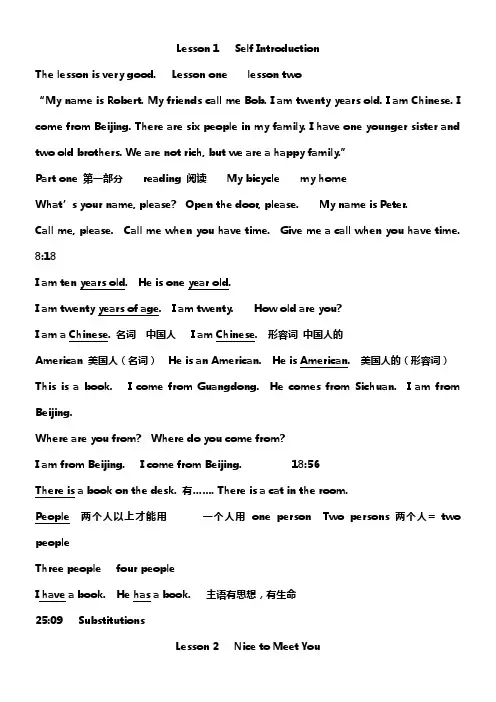
Lesson 1 Self IntroductionThe lesson is very good. Lesson one lesson two“My name is Robert. My friends call me Bob. I am twenty years old. I am Chinese. I come from Beijing. There are six people in my family. I have one younger sister and two old brothers. We are not rich, but we are a happy family.”Part one 第一部分reading 阅读My bicycle my homeWhat’s your name, please? Open the door, please. My name is Peter.Call me, please. Call me when you have time. Give me a call when you have time. 8:18I am ten years old. He is one year old.I am twenty years of age. I am twenty. How old are you?I am a Chinese. 名词中国人I am Chinese. 形容词中国人的American 美国人(名词)He is an American. He is American. 美国人的(形容词)This is a book. I come from Guangdong. He comes from Sichuan. I am from Beijing.Where are you from? Where do you come from?I am from Beijing. I come from Beijing. 18:56There is a book on the desk. 有……. There is a cat in the room.People 两个人以上才能用一个人用one person Two persons 两个人= two peopleThree people four peopleI have a book. He has a book. 主语有思想,有生命25:09 SubstitutionsLesson 2 Nice to Meet You“HI! My name is Mike. Hi! I’m Nancy. Nice to meet you. Nice to meet you, too. Where are you from? I’m from Shanghai. And you? I’m from Chicago. ” 1:31 Hi! I am Mike. I’m Mike. HI! There. 嗨!你好。
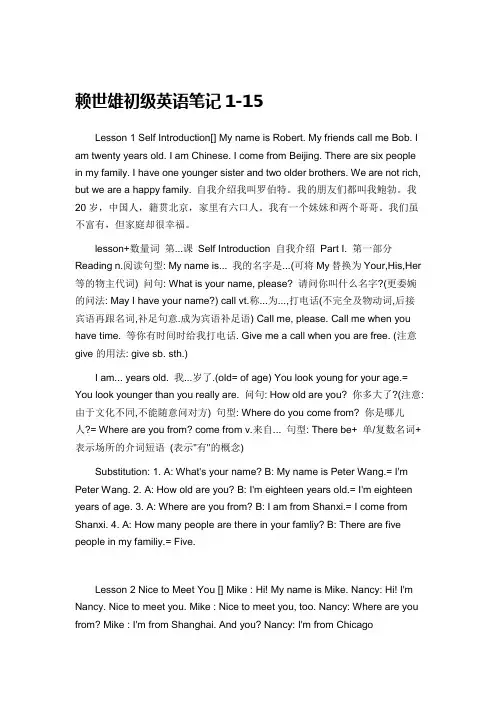
赖世雄初级英语笔记1-15Lesson 1 Self Introduction[] My name is Robert. My friends call me Bob. I am twenty years old. I am Chinese. I come from Beijing. There are six people in my family. I have one younger sister and two older brothers. We are not rich, but we are a happy family. 自我介绍我叫罗伯特。
我的朋友们都叫我鲍勃。
我20岁,中国人,籍贯北京,家里有六口人。
我有一个妹妹和两个哥哥。
我们虽不富有,但家庭却很幸福。
lesson+数量词第...课Self Introduction 自我介绍Part I. 第一部分Reading n.阅读句型: My name is... 我的名字是...(可将My替换为Your,His,Her 等的物主代词) 问句: What is your name, please? 请问你叫什么名字?(更委婉的问法: May I have your name?) call vt.称...为...,打电话(不完全及物动词,后接宾语再跟名词,补足句意.成为宾语补足语) Call me, please. Call me when you have time. 等你有时间时给我打电话. Give me a call when you are free. (注意give的用法: give sb. sth.)I am... years old. 我...岁了.(old= of age) You look young for your age.= You look younger than you really are. 问句: How old are you? 你多大了?(注意:由于文化不同,不能随意问对方) 句型: Where do you come from? 你是哪儿人?= Where are you from? come from v.来自... 句型: There be+ 单/复数名词+ 表示场所的介词短语(表示"有"的概念)Substitution: 1. A: What's your name? B: My name is Peter Wang.= I'm Peter Wang. 2. A: How old are you? B: I'm eighteen years old.= I'm eighteen years of age. 3. A: Where are you from? B: I am from Shanxi.= I come from Shanxi. 4. A: How many people are there in your famliy? B: There are five people in my familiy.= Five.Lesson 2 Nice to Meet You [] Mike : Hi! My name is Mike. Nancy: Hi! I'm Nancy. Nice to meet you. Mike : Nice to meet you, too. Nancy: Where are you from? Mike : I'm from Shanghai. And you? Nancy: I'm from Chicago幸会迈克:嗨!我叫迈克。
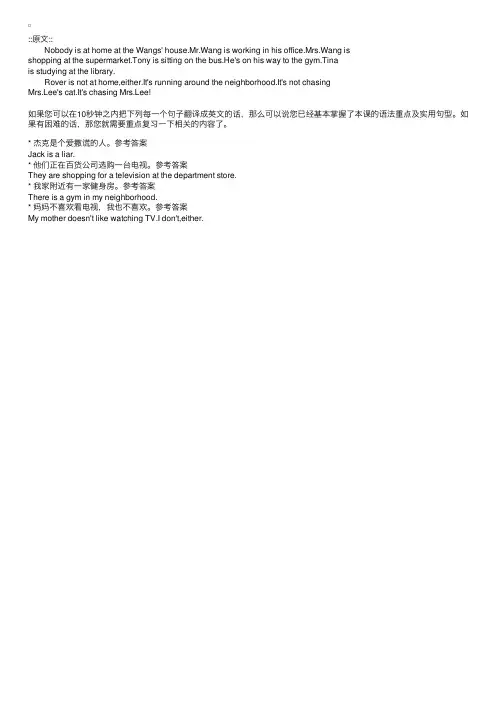
::原⽂::
Nobody is at home at the Wangs' house.Mr.Wang is working in his office.Mrs.Wang is
shopping at the supermarket.Tony is sitting on the bus.He's on his way to the gym.Tina
is studying at the library.
Rover is not at home,either.It's running around the neighborhood.It's not chasing
Mrs.Lee's cat.It's chasing Mrs.Lee!
如果您可以在10秒钟之内把下列每⼀个句⼦翻译成英⽂的话,那么可以说您已经基本掌握了本课的语法重点及实⽤句型。
如果有困难的话,那您就需要重点复习⼀下相关的内容了。
* 杰克是个爱撒谎的⼈。
参考答案
Jack is a liar.
* 他们正在百货公司选购⼀台电视。
参考答案
They are shopping for a television at the department store.
* 我家附近有⼀家健⾝房。
参考答案
There is a gym in my neighborhood.
* 妈妈不喜欢看电视,我也不喜欢。
参考答案
My mother doesn't like watching TV.I don't,either.。
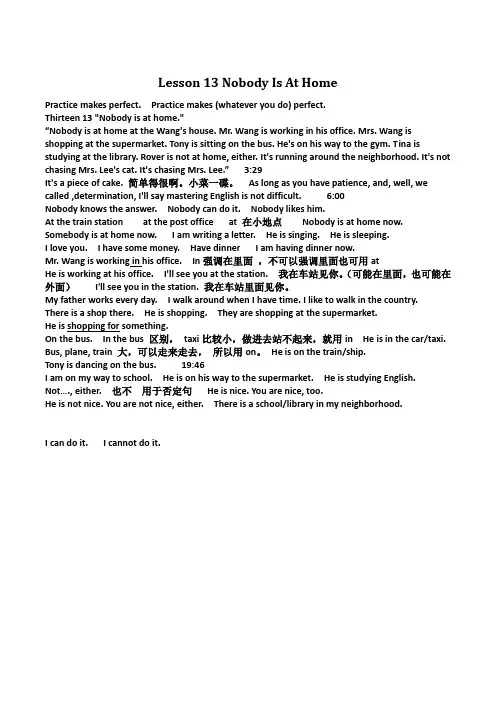
Lesson 13 Nobody Is At HomePractice makes perfect. Practice makes (whatever you do) perfect.Thirteen 13 "Nobody is at home."“Nobody is at home at the Wang's house. Mr. Wang is working in his office. Mrs. Wang is shopping at the supermarket. Tony is sitting on the bus. He's on his way to the gym. Tina is studying at the library. Rover is not at home, either. It's running around the neighborhood. It's not chasing Mrs. Lee's cat. It's chasing Mrs. Lee.”3:29It's a piece of cake. 简单得很啊。
小菜一碟。
As long as you have patience, and, well, we called ,determination, I'll say mastering English is not difficult. 6:00Nobody knows the answer. Nobody can do it. Nobody likes him.At the train station at the post office at 在小地点Nobody is at home now. Somebody is at home now. I am writing a letter. He is singing. He is sleeping.I love you. I have some money. Have dinner I am having dinner now.Mr. Wang is working in his office. In强调在里面,不可以强调里面也可用atHe is working at his office. I'll see you at the station. 我在车站见你。
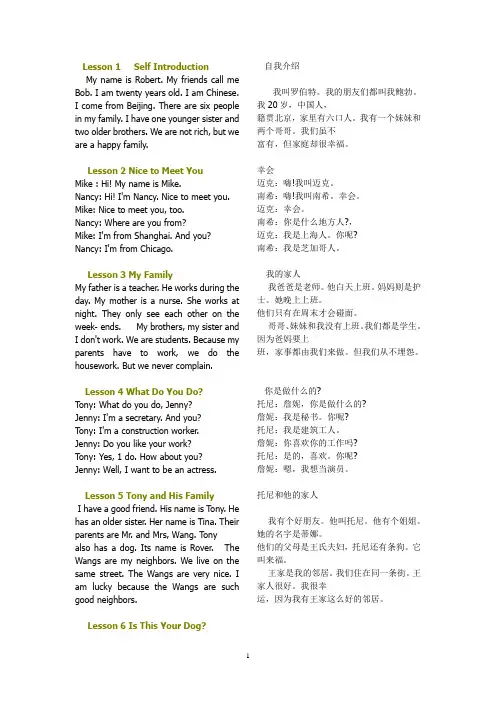
Lesson 1 Self IntroductionMy name is Robert. My friends call me Bob. I am twenty years old. I am Chinese.I come from Beijing. There are six people in my family. I have one younger sister and two older brothers. We are not rich, but we are a happy family.自我介绍我叫罗伯特。
我的朋友们都叫我鲍勃。
我20岁,中国人,籍贯北京,家里有六口人。
我有一个妹妹和两个哥哥。
我们虽不富有,但家庭却很幸福。
Lesson 2 Nice to Meet YouMike : Hi! My name is Mike.Nancy: Hi! I'm Nancy. Nice to meet you. Mike: Nice to meet you, too.Nancy: Where are you from?Mike: I'm from Shanghai. And you? Nancy: I'm from Chicago. 幸会迈克:嗨!我叫迈克。
南希:嗨!我叫南希。
幸会。
迈克:幸会。
南希:你是什么地方人?,迈克:我是上海人。
你呢? 南希:我是芝加哥人。
Lesson 3 My FamilyMy father is a teacher. He works during the day. My mother is a nurse. She works at night. They only see each other on the week- ends. My brothers, my sister and I don't work. We are students. Because my parents have to work, we do the housework. But we never complain.我的家人我爸爸是老师。
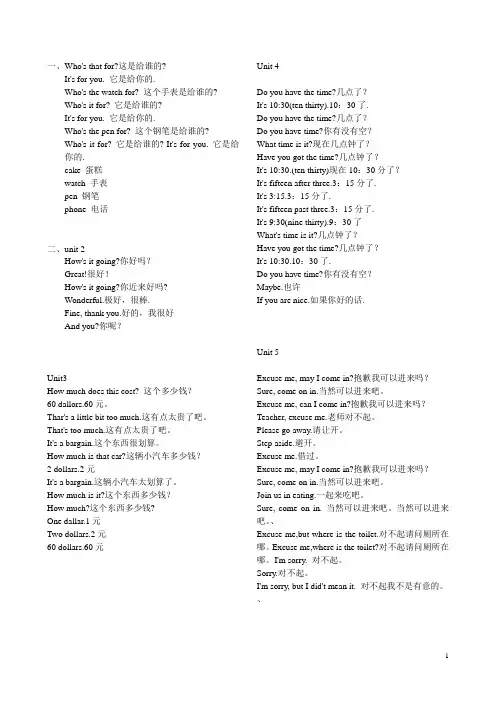
一、Who's that for?这是给谁的?It's for you. 它是给你的.Who's the watch for? 这个手表是给谁的?Who's it for? 它是给谁的?It's for you. 它是给你的.Who's the pen for? 这个钢笔是给谁的?Who's it for? 它是给谁的? It's for you. 它是给你的.cake 蛋糕watch 手表pen 钢笔phone 电话二、unit 2How's it going?你好吗?Great!很好!How's it going?你近来好吗?Wonderful.极好,很棒.Fine, thank you.好的,我很好And you?你呢?Unit3How much does this cost? 这个多少钱?60 dallors.60元。
Thar's a little bit too much.这有点太贵了吧。
That's too much.这有点太贵了吧。
It's a bargain.这个东西很划算。
How much is that car?这辆小汽车多少钱?2 dollars.2元It's a bargain.这辆小汽车太划算了。
How much is it?这个东西多少钱?How much?这个东西多少钱?One dallar.1元Two dollars.2元60 dollars.60元Unit 4Do you have the time?几点了?It's 10:30(ten thirty).10:30了.Do you have the time?几点了?Do you have time?你有没有空?What time is it?现在几点钟了?Have you got the time?几点钟了?It's 10:30.(ten thirty)现在10:30分了?It's fifteen after three.3:15分了.It's 3:15.3:15分了.It's fifteen past three.3:15分了.It's 9:30(nine thirty).9:30了What's time is it?几点钟了?Have you got the time?几点钟了?It's 10:30.10:30了.Do you have time?你有没有空?Maybe.也许If you are nice.如果你好的话.Unit 5Excuse me, may I come in?抱歉我可以进来吗?Sure, come on in.当然可以进来吧。

教案:Lesson 13.《At School》一、教学目标1. 知识目标(1)能够听懂、会说、会读本课的生词和重点句子。
(2)能够运用所学知识介绍自己的学校和日常生活。
2. 能力目标(1)能够正确使用一般现在时描述日常活动和课程。
(2)能够通过图片和情景,正确运用动词短语进行表达。
3. 情感目标培养学生热爱学校生活,乐于交流和分享的情感态度。
二、教学内容1. 主题:介绍学校和日常生活。
2. 语言知识:本课介绍了学校的一些场所和课程,以及一般现在时的用法。
3. 语言技能:听、说、读、写。
三、教学重点与难点1. 重点:能够听懂、会说、会读本课的生词和重点句子,能够运用动词短语描述学校和日常生活。
2. 难点:一般现在时的用法,以及如何正确运用动词短语进行表达。
四、教具与学具准备1. 教具:PPT、图片、卡片、录音机、磁带。
2. 学具:课本、练习本、铅笔、橡皮。
五、教学过程1. 热身(5分钟)(1)教师与学生用中文进行简单的交流,询问学生的一些基本信息,如姓名、年龄、年级等。
(2)教师引导学生用中文介绍自己的学校和日常生活。
2. 导入(10分钟)(1)教师播放本课的录音,让学生听懂并重复句子。
(2)教师出示图片,引导学生用中文描述图片中的场景和人物。
3. 呈现(10分钟)(1)教师出示卡片,呈现本课的生词和重点句子。
(2)教师引导学生用英语进行朗读和书写。
4. 练习(10分钟)(1)教师组织学生进行小组活动,用英语讨论学校和日常生活。
(2)教师选取几个小组的汇报,进行点评和指导。
5. 巩固(10分钟)(1)教师出示情景,让学生运用动词短语进行表达。
(2)教师选取几位学生的表达,进行点评和指导。
六、板书设计板书设计如下:Lesson 13 At School句子:What's this? It's a/anWhat's he/she? He's a/an七、作业设计1. 抄写生词和重点句子。
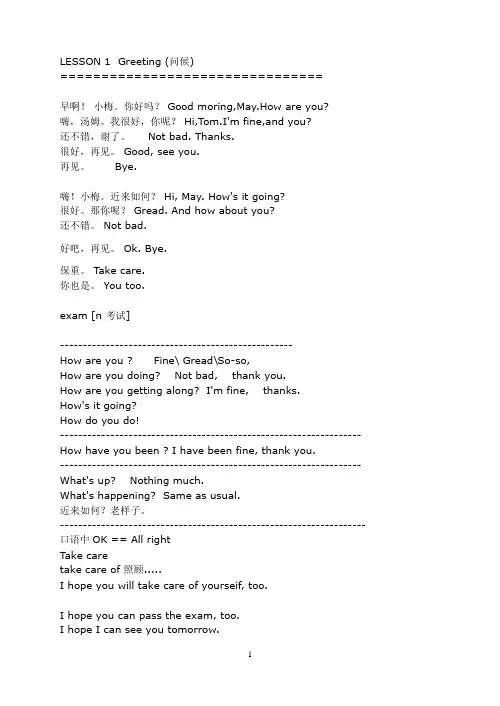
LESSON 1 Greeting (问候)================================早啊!小梅。
你好吗? Good moring,May.How are you?嗨,汤姆。
我很好,你呢? Hi,Tom.I'm fine,and you?还不错,谢了。
Not bad. Thanks.很好,再见。
Good, see you.再见。
Bye.嗨!小梅。
近来如何? Hi, May. How's it going?很好。
那你呢? Gread. And how about you?还不错。
Not bad.好吧,再见。
Ok. Bye.保重。
Take care.你也是。
You too.exam [n 考试]---------------------------------------------------How are you ? Fine\ Gread\So-so,How are you doing? Not bad, thank you.How are you getting along? I'm fine, thanks.How's it going?How do you do!------------------------------------------------------------------ How have you been ? I have been fine, thank you.------------------------------------------------------------------ What's up? Nothing much.What's happening? Same as usual.近来如何?老样子。
------------------------------------------------------------------- 口语中OK == All rightTake caretake care of 照顾.....I hope you will take care of yourseif, too.I hope you can pass the exam, too.I hope I can see you tomorrow.LESSON 2 Courtesy(礼貌)===============================对不起!请问你是安吗? Excuse me. Are you Ann?不,我不是。
赖世雄美语从头学-初级篇(下)1. Light up点火(不及物动词) You can’t light up here , smoking isn’t allowed put out熄灭2. It is no use + doing …是没有用的It’s no use talking to her pay a heavy price付出惨痛/很大的代价3. Stop + doing 停止正在做的事情John stopped talking to me when his father walked inStop + to do停下去做另一件事John stopped to talk to me when he saw me约翰看到我时便停下来与我说话4. Try + doing尝试/试试… Don’t try swimming alone in the riverTry + to do设法要…I’ll try to call you later today5. 关系代词一共有who、whom、which、that、whose五个,均视为连词,引导定语从句。
该从句视为形容词,修饰之前的名词,下面分别说明各关系代词的用法(关系代词均应紧邻被代替的名词之后):1) Who、whom:这两个关系代词专门修饰人,换言之,who、whom之前一定有一个表示人的名词。
Who在从句中作主语,whom则作宾语。
John is my good friend who never lies John is my good friend whom I trusted2) Which:which是用以代替除人以外一切事物(如动物、植物、静物、地方、概念等)的关系代词,在所引导的定语从句中,可作主语或宾语。
使用时之前一定要有可被代替(除人以外)的名词。
He doesn’t study , which makes his father angry He lives in Shanghai , which I want to visit soon3) Whose:whose是所有格关系代词,代替his、her、their、its等人或物的所有格代词。
赖世雄英语学习笔记内部编号:(YUUT-TBBY-MMUT-URRUY-UOOY-DBUYI-0128)赖世雄美语笔记——魏仕超抄的学渣出版社STUDY-GARBAGE PRESS目录美语入门LESSON 1 greetings词汇:greetings n.问候招呼致意idiom n.短语句子:A:see you later B:alligaterhow are youhow are you doinghow are you getting alonehow have you beenhow's it goingwhat's upwhat's happeningLESSON 2 courtesy词汇:courtesy n.礼貌LESSON 3 what's your name词汇:nationality n.国籍句子:may I have your name please?=what's your nameLESSON 4 family name词汇:family name 姓this that these those这个那个这些那些以上为指示代词,也可以有指示形容词的功能,例如this book is goodLESSON 5 how do you do相当于你好,不可以回答I'm fine词汇:occupation n.职业secretary n.秘书pilot n.飞行员句子:how do you do相当于你好,不可以回答I'm fine要说how do you do来回应what do you do你是做什么的LESSON 6 it's five past three词汇:ma'am n.夫人句子:it's five past three=it's three o five三点过五分,十分之后不用加"o"it's twenty to five=it's four fortyLESSON 7月份词汇:January February March April May June July August September October November December句子:June 2 1998这个2不是基数词,是序数词what's today's date今天几月几号LESSON 8 there be句型句子:how's the weather in Beijing=what's the weather like in Beijing 表示“有”句首是人或动物应该使用haveI have a book句首是场所或时间,应该用there is/are在there is/are起首的句型中,应该将there视为固定用语,译成“有”而不要译成“那里是”,若要表示“那里/这里有...”应该说there is.....therethere is a man有个人there has a man 无此用法there is a man there 那里有个人LESSON 9 he's not in句子:he's not in他不在“留话”leave/take messageLESSON 10 can I be of any help for you词汇:clinic n.诊所句子:can I be of any help for you?我能帮您什么LESSON 11 准备好点单了吗词汇:starve v.饥饿,饿死section n.区域,部门句子:are you ready to ordermay I take your order nowLESSON 13 牛排几分熟词汇:dessert n.甜点steak n.牛排book v.登记well done全熟 medium六七分熟 medium rare四五分熟 rare3分熟LESSON 14 没重点词汇:brand n.品牌on sale 特价pants n.裤子,短裤pair 一条LESSON 15 量尺寸词汇:词汇:gift-wrap包装句子:take one's measurements量一下尺寸give sb. a hand=do sb. a favor帮忙go over there =go thereover用来加强语气表示就在那LESSON 16 one做代词词汇:high heeled n.高跟鞋clerk n.店员句子:one做代词时代替前面出现过的单数名词,ones代替复数名词LESSON 17 查字典词汇:tale n.故事consult v.查询sold out of n.卖完了句子:consult dictionary 查字典look up the word in dictionary 在字典里查词LESSON 18 here we are词汇:domestic n.国内的speed up 加速句子:here we are我们到了here you are/go 在这,拿去there you again 你又来这一套了LESSON 19 how come词汇:twin adj.成双的,双胞胎的rate n.价格费用lobby n.大厅reservation n.预定句子:how come单独用做“怎么回事”句子里how come I didn't know 是说我怎么不知道rate做“价格”时一般用复数what are your rates...LESSON 20 have a reservation强调预定这件事的事实词汇:suite n.套房charge n.记账bellboy n.男服务生句子:have a reservation强调预定事实make a reservation强调预定动作LESSON 21 兑换外币银行说的话词汇:change v.交换n.零钱cash n.现金v.兑换现金currency n.货币change money换钱change A for B把A换成B句子:how do you want your money?兑换外币时银行对顾客说的话,你要兑换多少面值will my passport dodo原意“做”也可以表示“行”“可以”that'll doseven hundreds eight tens and the rest in change此处的rest是代词,代指“其余的”LESSON 22 问生日和介词用法词汇:reconfirm v.再确认confirmation n.确定depart for动身前往某地intend v.打算book in 登记入住句子:date of birth包含年月日,birthday不包含年份表示确切时间介词用at,表示年月季节上午下午晚上时介词用in,表示日期和星期几介词用onLESSON 23 集合名词和arrive in词汇:lounge n.休息室arrival lounge 入境大厅tax n.税aisle n.通道take off 起飞,升空smoking section 吸烟区句子:arrive at后接小地点如邮局车站等arrive in后接大地点如城市国家英文中两个动词在同一个句子时,必须有连词连接,否则为错,但是go和come以动词原形出现时则可以省略连词and,直接加另一个动词。
《赖世雄初级美语》学习笔记L10 What are you doing?How are you getting along? 你最近怎么样?So so 马马虎虎L11As a matter of fact = in fact 事实上L 171、be across from…在….的对面2、as a matter of fact = in fact 事实上3、He likes me. 喜欢He is like me. 他像我一样。
n. + like 像L181、Can you tell me …Could you tell me …更客气Can you show me …2、You’re welcome. = D on’t mention it.3、He lives in(out of)town. 他住在城里。
不加定冠词the L221、go to the movies 看电影固定用法2、a piece of glass 一块玻璃,一片玻璃L28take a bus/taxi/train 搭公交/的士/火车drive sb. crazy 逼迫某人发狂be crazy about 为…疯狂(热爱)It pays to learn English. 学英语是值得的。
for rent 出租I have a house to rent.None of them is happy.None of them are happy.too 肯定句either 否定句-ed 感到…. –ing 令人…The baby is tiring. 宝贝(抱着)令人累的。
The baby is tired. 宝贝困了L32Here you are. 拿去吧。
You bet. 别客气。
Don’t mention it. 别客气L33a business suit 西装L34go to the movies 看电影L35little 否定(不可数)没有多少 a little 肯定(不可数)有一些few 否定(可数)没有几个 a few 肯定(可数)有几个only a little = little only a few = fewmuch 通常用在否定句中(不可数)a lot of 用在肯定句(可数或不可数)many 肯定、否定都行(可数)drink 可数many drinks 饮料have a drinkat first … but laterL43if you don’t study, you can’t get anywhere.He is ill in hospital.in hospital 住院[英]in the hospital 在医院里,住院[美]ought to = shouldmay 很可能might 也许angry with sb.angry about/at sth.L44as a matter of fact = in factThere must be something wrong with her. 她一定出事了。
赖世雄美语从头学-⼊门篇赖世雄美语从头学-⼊门篇1. How are you=How are you doing=How are you getting along?你好吗?Great, thanks! Fine, thanks! Not bad, thanks! So-so, thanks!What’s up? / What’s happening?近况如何?Nothing / same as usual 没什么/⽼样⼦2. A: see you later B: take care(保重) A: you too3. “Excuse me”或”I’m sorry”之后除可置句点以外,亦可置逗点,再置连接词but,以连接另⼀个句⼦。
but原意为”但是”,但此处不必译出:Excuse me, but where is the station? I’m sorry , but I’m new here4. A:Thank you for your help B:You’re welcome/Don’t mention it/Not at all/No problem5. Where are you from / Where do you come from / what’s your nationality前⾯两个可⽤于询问对⽅的省籍或国籍,但最后⼀句则仅限于国籍6. May I have your name, please?=What’s your name?上列两句均是向对⽅请教姓名的问句。
虽然意思相同,但显然第⼀个问句语⽓较客⽓有礼,多在正式的场合中使⽤。
第⼆个问句则为长辈对晚辈或上次对下属使⽤。
7. How old are you?=What’s your age?以上都是询问对⽅年龄的问句。
咱们中国⼈彼此见⾯可以询问对⽅年龄,但与西⽅⼈交往时,除⾮对⽅主动透露⾃⼰的年龄,否则我们随意询问别⼈的年龄会被视为不礼貌的⾏为。
赖世雄美语从头学-入门篇今天开始进入英语加强训练了,不过虽然说是加强,不过是从最最基础开始学起的,旨在整体提高自己的英语水平。
毕竟不是为了应付应试考试,而是想真正提高,然后看了恶魔奶爸的文章和推荐,决定主要以赖世雄的材料为主,加上ESLPOD的输入辅助吧。
赖世雄美语从头学-入门篇的第一课真的是非常基础,lesson 1: Greetings。
其实我开始有点质疑自己有没有必要从这么基础开始学起,而且我也不是那么闲,但是发现其实里面还真有自己不知道的知识点,所以还是静下心来抱着虚心的心态好好学,不过期间我也会同时给自己按按摩什么的一心二用。
接下来的知识点都是针对自己需要强调的。
1. Greetings,有加s,而且是必须加s,毕竟打招呼一句话解决不了2. bad和bed的区别,前者大e,后者小e3. thank不要吝啬,加s4. good afternoon也代表午安5. -See you later-Alligator 鳄鱼,没有具体意思,年轻人的俏皮话,和later尾音相似6. 问候语(下划线较常用)How are you? (多正式)How's it going?What's up? (年轻人)How are you doing? (熟朋友)How are you getting alone?How have you been?What's happening?7. 问候答句区别a. 都有youHow are you?=How are you doing?=How are you getting alone?answer:I'm fine, thank you. (跟fine有关的回答持保留意见,比较多说法是一般不用fine这种回答,我个人听到最多的就是good) Fine, thanks.Great, thanks.Not bad, thanks.So-so, thank you.b. How have you been?这个问法是完成时,所以不能用amanswer:I have been fine, thank you.Fine, thank you.c. How's it going?answer: Not bad, thank you.So-so, thank you.Great, thank you.Fine, thank you.d. What's up/What's happening?answer: Nothing much.Same as usual.8. 感谢Thanks a lot. (非正式)Thanks a million (俏皮话)Lesson 2 Courtesy (礼貌)Idiom: Courtesy costs nothing. 礼貌不花钱;礼多人不怪。
赖世雄美语:初级美语Lesson 1 Self Introduction自我介绍Lesson 2 Nice to Meet You幸会Lesson 3 My Family我的家人Lesson 4 What Do You Do?你是做什么的?Lesson 5 Tony and His Family托尼和他的家人Lesson 6 Is This Your Dog?这是你的狗吗?Lesson 7 Tony and Tina托尼和蒂娜Lesson 8 Do You Speak Spanish?你会说西班牙语吗?Lesson 9 A Busy Family忙碌的家庭Lesson 10 What Are You Doing?你在做什么?Lesson 11 My Foreign Classmates我的外籍同学Lesson 12 Where's Chen from?小陈是哪一国人?Lesson 13 Nobody Is at Home没人在家Lesson 14 Why Are You Smiling?你为什么在微笑?Lesson 15 Mrs. Lee's Kitchen李太太的厨房Lesson 16 Where Are My Keys?我的钥匙在哪里?Lesson 17 My Hometown我的家乡Lesson 18 Is It near the Post Office?就在邮局附近吗?Lesson 19 I Have Two Friends我有两个朋友Lesson 20 She Is Beautiful她很漂亮Lesson 21 I Don't Know Anyone我谁都不认识Lesson 22 Do You Want to Dance?你想跳舞吗?Lesson 23 The Book Is Mine这本书是我的Lesson 24 It's Mine它是我的Lesson 25 My Father我的父亲Lesson 26 He Usually Plays Tennis他通常打网球Lesson 27 Jack and His Dog杰克和他的狗Lesson 28 I Always Walk我都是走路去Lesson 29 Poor Dick可怜的迪克Lesson 30 Money Doesn't Grow on Trees挣钱是很辛苦的Lesson 31 Poor Amy可怜的艾米Lesson 32 Coins for the Phone打投币电话Lesson 33 She Wants to Wear Something Formal她想穿正式的衣服Lesson 34 Let's Go to a Disco咱们到迪斯科舞厅去Lesson 35 There's Little Food菜很少Lesson 36 A Lot of Bills许多账单Lesson 37 A Wonderful Time美好时光Lesson 38 Nobody Answered the Phone没人接电话Lesson 39 Homesickness乡愁Lesson 40 Everybody Spoke English大家都说英语Lesson 41 Going Camping露营Lesson 42 Are You Having Fun?你玩得愉快吗?Lesson 43 Killing Two Birds with One Stone两全其美Lesson 44 She Had a Bad Cold她患了重感冒Lesson 45 What a Nightmare!真是一场噩梦啊!Lesson 46 A Terrible Headache头痛得很厉害Lesson 47 Be Polite要有礼貌Lesson 48 Don't Mention It别客气Lesson 49 Never T alk to Strangers千万别跟陌生人说话Lesson 50 You're Sally, Aren't You?你是萨莉,对不对?Lesson 51 My Girlfriend我的女友Lesson 52 Sam's OK山姆不错Lesson 53 Country Life乡间生活Lesson 54 I Like Brighter Colors我喜欢较明亮的颜色Lesson 55 More Is Not Always Better多未必佳Lesson 56 I Want the Cheaper One我要买那块便宜的手表Lesson 57 The Elephant and the Whale大象与鲸鱼Lesson 58 The Smartest Teacher最聪明的老师Lesson 59 My Best Friend我最好的朋友Lesson 60 The Longest River in the World世界上最长的河流Lesson 61 The Hare and the Turtle兔子与乌龟Lesson 62 Practice Makes Perfect熟能生巧Lesson 63 Saving a Drowning Boy救难记Lesson 64 Dan's a Good Swimmer丹很会游泳Lesson 65 The Fortune-teller算命师Lesson 66 Will It Leave on Time?它会准时开吗?Lesson 67 Getting Married结婚Lesson 68 Are You Going to Come?你会来吗?Lesson 69 Running a Bookstore经营书店Lesson 70 When Will You Be Moving?你什么时候搬家?Lesson 71 Working Hard努力用功Lesson 72 Remember to Wash别忘了漱洗Lesson 73 Joe's Restaurant乔的餐厅Lesson 74 You Ought to Learn to Swim你应当学习游泳Lesson 75 Michael's Dream迈克尔的梦想Lesson 76 I Want to Be a Doctor我想当医生Lesson 77 Rome Wasn't Built in a Day罗马不是一天建成的Lesson 78 Don't Be Discouraged不要泄气Lesson 79 Showing Off炫耀Lesson 80 I'm Good at Cooking我擅长烹饪Lesson 81 A Heavy Price to Pay惨重的代价Lesson 82 Smoking Isn't Allowed不准吸烟Lesson 83 A Nice Person大好人Lesson 84 What's She Like?她是什么样的人呢?Lesson 85 Blood Types血型Lesson 86 What's Your Blood Type?你是什么血型?Lesson 87 Society Is Changing Rapidly社会正快速地变化Lesson 88 You Need a Vacation你需要度个假Lesson 89 Australia澳大利亚Lesson 90 A Good Place to Visit一个好玩的地方Lesson 91 Computers电子计算机Lesson 92 Hold On, Please请等一下Lesson 93 Pride Comes Before a Fall骄兵必败Lesson 94 Congratulations恭喜Lesson 95 A Balanced Diet均衡的饮食Lesson 96 You're Looking Great!你看起来棒极了! Lesson 97 By T axi乘坐出租车Lesson 98 Where to, Lady?小姐,你要到哪里去?Lesson 99 Asking for Directions问路Lesson 100 Turn Right向右转Lesson 101 Who Discovered America?谁发现了美洲?Lesson 102 The Same First Name同名Lesson 103 Air Pollution空气污染Lesson 104 We Need Fresh Air我们需要新鲜空气Lesson 105 Recycling资源回收再利用Lesson 106 Litterbugs垃圾虫Lesson 107 The Secret of Longevity长寿的秘诀Lesson 108 Slow Down慢下来Lesson 109 Discovering Africa探索非洲Lesson 110 Easier Said than Done说来容易做来难Lesson 111 Confucius孔子Lesson 112 It's My Pleasure不客气Lesson 113 Something Well Begun Is Half Done好的开始是成功的一半Lesson 114 No Pain, No Gain一分耕耘,一分收获Lesson 115 Wait and See静候观望Lesson 116 We're Engaged我们订婚了Lesson 117 Time Flies光阴似箭Lesson 118 The Eiffel Tower埃菲尔铁塔Lesson 119 My Name Isn't Jack我的名字不是杰克Lesson 120 It's My Treat由我做东Lesson 121 The Greatest Killers最大的杀手Lesson 122 I Quit Smoking我戒烟了Lesson 123 An Accident一桩事故Lesson 124 Beautiful Shanghai美丽的上海市Lesson 125 Studying Seriously认真地学Lesson 126 Playing the Piano弹钢琴Lesson 127 An Honest Man诚实的人Lesson 128 The Job Interview工作面试Lesson 129 Seven Years' Bad Luck七年的背运Lesson 130 He Will Bite You它会咬你Lesson 131 If I Were a Millionaire假如我是百万富翁Lesson 132 A Good Citizen好公民Lesson 133 Dealing with Exams应付考试Lesson 134 Guess What?你猜怎么了?Lesson 135 Just Do It即说即做Lesson 136 Are You Free?你有空吗?Lesson 137 Van Gogh梵高Lesson 138 You're Beautiful你很漂亮Lesson 139 Don't Be Shy不要害羞Lesson 140 What's New?近况如何?Lesson 141 Global Warming全球气温上升Lesson 142 No Smoking禁止吸烟Lesson 143 Man's Best Friend人类最好的朋友Lesson 144 The Year of the Dog狗年Lesson 145 Billy's Goal in Life比利的人生目标Lesson 146 Being Happy快乐Lesson 147 Television Addiction电视迷Lesson 148 Hurry Back快点回来赖世雄美语:中级美语Lesson 1 Rome Wasn't Built in a Day罗马不是一天建成的Lesson 2 How to Improve Your English如何提高你的英文Lesson 3 The City of Song音乐之都Lesson 4 He Who Hesitates Is Lost迟疑者将丧失良机Lesson 5 Bungee Jumping蹦极Lesson 6 Nothing Ventured, Nothing Gained不入虎穴,焉得虎子Lesson 7 Doctor Death死亡医生Lesson 8 No Hearts or No Brains?铁石心肠还是没脑筋?Lesson 9 Be Thoughtful为别人着想Lesson 10 What Are Friends For?要不然要朋友干嘛? Lesson 11 Power Without Pollution只要能源,不要污染Lesson 12 Stop the Noise别吵了Lesson 13 Health Comes First健康至上Lesson 14 Quit Cold Turkey断然戒烟Lesson 15 Don't Rely on Luck!勿心存侥幸! Lesson 16 Study or Flunk用功读书或考试砸锅Lesson 17 A Computer Car电脑汽车Lesson 18 Nothing Is Perfect天下无“完”事Lesson 19 Blame It on Men都怪男人Lesson 20 A Weighty Problem“沉重”的负担Lesson 21 Coffee Bathing咖啡浴Lesson 22 Whiskey or Coffee?威士忌还是咖啡? Lesson 23 Earthquake Survival Tips地震时如何自保Lesson 24 Just Like a Woman像个女人一样Lesson 25 Restaurant Dos and Don'ts餐厅礼节Lesson 26 The Missing Tip失踪的小费Lesson 27 Thank Your Lucky Stars福星高照Lesson 28 Going on a Diet节食Lesson 29 Just a Dream噩梦一场Lesson 30 Yes, Sir是的, 老师Lesson 31 Good Feng Shui in New York纽约好风水Lesson 32 Goldfish, Souls and Coffee Tables金鱼、灵魂和茶几Lesson 33 A Deadly Current死亡暗流Lesson 34 A Lifesaving Kiss救命的一吻Lesson 35 A Sense of Security安全感Lesson 36 The Sex Maniac大色狼Lesson 37 Garbage Could Mean Money垃圾即黄金Lesson 38 That's Fashion那才叫做时髦Lesson 39 At the Foreign Exchange出国结汇Lesson 40 Changing Money兑换外币Lesson 41 Getting a T an晒黑Lesson 42 Roast Beef烤牛肉Lesson 43 Hi-tech Romance高科技恋情Lesson 44 Better Off with E-mail?电子邮件会更好?Lesson 45 Tough Guys Do Dance硬汉也跳舞Lesson 46 Anything for a Kiss为了吻不惜一切Lesson 47 Fast-food T alk快餐趣谈Lesson 48 Fast Food, Slow Service急惊风遇上慢郎中Lesson 49 Stop Snoring!别打呼了!Lesson 50 Laser Cures Snoring激光可治打鼾Lesson 51 Thanksgiving感恩节Lesson 52 A Thanksgiving Get-together感恩节团聚Lesson 53 Monkeying Around猴子吃大餐Lesson 54 Variety Is the Spice of Life人生要多彩多姿Lesson 55 Life after Death死而复生Lesson 56 Baby Trouble生儿育女的烦恼Lesson 57 New Asian Generation亚洲新生代Lesson 58 Like Father, Like Son有其父必有其子Lesson 59 About Moral Values道德价值观Lesson 60 How to Attract Boys如何吸引男孩子Lesson 61 Touring by T axi出租车逍遥游Lesson 62 Keep the Change不用找了Lesson 63 The Dying Languages消亡的语言Lesson 64 Speaking the Same Language说同样的语言Lesson 65 Italian Culture意大利文化Lesson 66 It's Nap Time现在是午睡时间Lesson 67 All That Glitters Is Not Gold中看未必中用Lesson 68 Don't Judge a Book by Its Cover勿以貌取人(谚语)Lesson 69 Mean What You Say说话算话Lesson 70 A Promise Is a Promise君子一言,驷马难追Lesson 71 Earth in Danger地球危机Lesson 72 Saving the World拯救世界Lesson 73 Don't Be a Fish out of Water不要觉得别扭Lesson 74 Get with It, Bob别土了,鲍勃Lesson 75 The Amish亚米希人Lesson 76 Live and Let Live自己活也让别人活Lesson 77 Think Before You Speak三思而后言Lesson 78 Believe It or Not信不信由你Lesson 79 The Weaker Sex?女人是弱者? Lesson 80 Girls Versus Boys女孩对男孩Lesson 81 Stop to Smell the Flowers驻足片刻闻花香Lesson 82 Being Around Nature投入大自然的怀抱Lesson 83 Man's Best Friend人类最好的朋友Lesson 84 Oh My God!我的天啊!Lesson 85 Beauty Is Only Skin-deep美色是肤浅的Lesson 86 Me and My Big Mouth都怪我多嘴Lesson 87 Traveling by Plane搭乘飞机旅行Lesson 88 Bon Voyage!一路顺风!Lesson 89 AIDS艾滋病Lesson 90 What an Idiot!真是个大笨蛋!Lesson 91 Kayaking划独木舟Lesson 92 Only the Good Die Young好人不长命Lesson 93 One Good Turn Deserves Another善有善报Lesson 94 As Poor As a Church Mouse一贫如洗Lesson 95 The Poor Man's Cure-all穷人的万灵丹Lesson 96 What's the Point of Chewing Gum?嚼口香糖有啥用?Lesson 97 The Bronze Age青铜器时代Lesson 98 Speaking from the Grave地府之言Lesson 99 Stop Swearing!别说脏话了!Lesson 100 Stop Bullshitting!别瞎扯了!Lesson 101 A Red-hot Cure火辣辣的药物Lesson 102 Old Wives' Tales无稽之谈Lesson 103 The Tallest Building in the World世界最高的大楼Lesson 104 Who Cares Anyway?反正谁在乎呢?Lesson 105 Catch-22进退维谷Lesson 106 What a Dilemma!真是左右为难!Lesson 107 Seeing Is Believing眼见为实Lesson 108 No Free Lunch没有白吃的午餐Lesson 109 Adorable Koalas in Danger可爱的考拉有危险了Lesson 110 Killing Is No Solution屠杀并非解决之道Lesson 111 I Want to Marry Your Wife我想娶你的老婆Lesson 112 You've Got to Be Kidding!爱说笑!Lesson 113 Heavy and Chubby胖嘟嘟Lesson 114 Muscular My Foot!强壮个什么!Lesson 115 A Very Special Juice琼浆玉液Lesson 116 I Prefer My Own Brand我喜欢自己酿的Lesson 117 Cheer Up!高兴点吧!Lesson 118 What a Grouch!好个抱怨鬼!Lesson 119 Where's the Toilet?厕所在哪儿?Lesson 120 It's Too Late来不及了Lesson 121 Kick the Habit戒除习惯Lesson 122 Candy Helps?糖果有助戒烟吗?Lesson 123 Early to Bed, Early to Rise早睡早起身体好Lesson 124 Don't Be a Lazybones莫做懒骨头Lesson 125 Partying with Foreigners与老外同乐Lesson 126 Wanna Dance?想跳舞吗?Lesson 127 A Shocking Experience骇人的经历Lesson 128 A Long Ride长路漫漫Lesson 129 Dog Days Off爱犬假Lesson 130 An Inch Given, a Mile T aken得寸进尺Lesson 131 Lost and Found失物招领Lesson 132 What's in the Bag?袋子里装了什么?Lesson 133 Smile, Everybody!大家一起来微笑!Lesson 134 Konbanwa, Everybody!各位晚上好!Lesson 135 The Roaring Englishman吼叫的英国人Lesson 136 Letting Off Steam发泄精力Lesson 137 Going to the Barber's上理发厅Lesson 138 Don't Catch a Cold小心不要感冒了Lesson 139 The Dancing Cop泰国“舞”警Lesson 140 Going Bananas in Bangkok曼谷也疯狂Lesson 141 Men or Monkeys人或猴子Lesson 142 Say Cheese笑一笑Lesson 143 How to Improve Your Writing Skills如何提高你的写作技巧Lesson 144 Go for It事必躬亲Lesson145 Breakfast Improves MentalSharpness早餐使头脑灵敏Lesson 146 Doing It in the Pants拉在裤子里Lesson 147 Let Experience Be the Teacher让经验成为自己的老师Lesson 148 What a Terrible Experience多么可怕的经历。